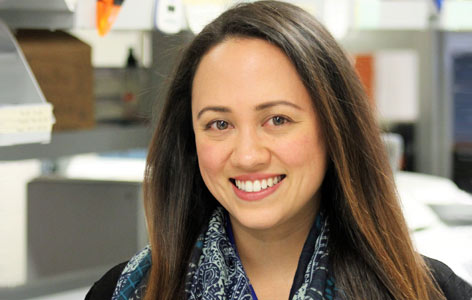Home page Description:
Krembil 2016 Spring Postdoctoral and Clinical Research Fellow Award Competition.
Posted On: October 21, 2016

Congratulations to the three winners of the Krembil 2016 Spring Postdoctoral & Clinical Research Fellow Award Competition! Read about the award‐winning projects below.
Trainee: Remy Pollock, PhD
Supervisor: Dr. Dafna Gladman
Project Title: Validation of Epigenetic Biomarkers of Psoriatic Arthritis.
Psoriatic disease demonstrates a parent‐of‐origin effect (PoE) that manifests as an increased risk, reduced age of onset and increased severity following male compared to female transmission. Dr. Pollock’s earlier work showed that PoE is mediated by heritable epigenetic mechanisms and that there is aberrant DNA methylation in sperm cells of psoriasis patients with or without arthritis. The aims of the study are to determine if epigenetic variations are transmissible between generations, whether they play a role in psoriasis pathogenesis, and if these variations can serve as biomarkers of psoriatic arthritis.
Trainee: Pia Vidal, PhD
Supervisor: Dr. Michael Fehlings
Project Title: Attenuation of Post‐Ischemia Inflammation to Inhibit Secondary Injury after Ischemia‐Reperfusion Injury Following Surgical Decompression for Degenerative Cervical Myelopathy
Degenerative Cervical Myelopathy is the most common form of spinal cord impairment in the world. It is the result of progressive compression of the cervical spinal cord due to degenerative age‐related conditions. The current “gold standard” for treatment is surgical decompression; however, some patients develop neurological complications following a successful surgery as a result of an ischemia‐reperfusion injury. Dr. Vidal hypothesizes that secondary injury produced by post‐ischemic inflammation can be attenuated by blocking the sustained recruitment of circulating blood monocytes.
Trainee: Gah‐Jone Won, PhD
Supervisor: Dr. Jeremy Sivak
Project Title: Developing an Ocular Pharmacokinetic/Pharmacodynamic Model Using an Ex‐Vivo Dynamic Perfusion System
Effective intraocular delivery of drug formulations is crucial for the treatment of common retinal diseases such as glaucoma, macular edema, diabetic retinopathy and age‐related macular degeneration. A major challenge for this route of administration is our lack of understanding and predictive capacity for how drugs and excipients interact with the eye upon injection. The purpose of this study is to optimize a Dynamic Ocular Drug Perfusion System to extend assessments of tissue viability, function as well as acute and long term pharmacokinetic and pharmacodynamic effects of intravitreally injected formulations.
Trainee: Remy Pollock, PhD
Supervisor: Dr. Dafna Gladman
Project Title: Validation of Epigenetic Biomarkers of Psoriatic Arthritis.
Psoriatic disease demonstrates a parent‐of‐origin effect (PoE) that manifests as an increased risk, reduced age of onset and increased severity following male compared to female transmission. Dr. Pollock’s earlier work showed that PoE is mediated by heritable epigenetic mechanisms and that there is aberrant DNA methylation in sperm cells of psoriasis patients with or without arthritis. The aims of the study are to determine if epigenetic variations are transmissible between generations, whether they play a role in psoriasis pathogenesis, and if these variations can serve as biomarkers of psoriatic arthritis.
Trainee: Pia Vidal, PhD
Supervisor: Dr. Michael Fehlings
Project Title: Attenuation of Post‐Ischemia Inflammation to Inhibit Secondary Injury after Ischemia‐Reperfusion Injury Following Surgical Decompression for Degenerative Cervical Myelopathy
Degenerative Cervical Myelopathy is the most common form of spinal cord impairment in the world. It is the result of progressive compression of the cervical spinal cord due to degenerative age‐related conditions. The current “gold standard” for treatment is surgical decompression; however, some patients develop neurological complications following a successful surgery as a result of an ischemia‐reperfusion injury. Dr. Vidal hypothesizes that secondary injury produced by post‐ischemic inflammation can be attenuated by blocking the sustained recruitment of circulating blood monocytes.
Trainee: Gah‐Jone Won, PhD
Supervisor: Dr. Jeremy Sivak
Project Title: Developing an Ocular Pharmacokinetic/Pharmacodynamic Model Using an Ex‐Vivo Dynamic Perfusion System
Effective intraocular delivery of drug formulations is crucial for the treatment of common retinal diseases such as glaucoma, macular edema, diabetic retinopathy and age‐related macular degeneration. A major challenge for this route of administration is our lack of understanding and predictive capacity for how drugs and excipients interact with the eye upon injection. The purpose of this study is to optimize a Dynamic Ocular Drug Perfusion System to extend assessments of tissue viability, function as well as acute and long term pharmacokinetic and pharmacodynamic effects of intravitreally injected formulations.

Remy Pollock

Pia Vidal

Gah-Jone Won

